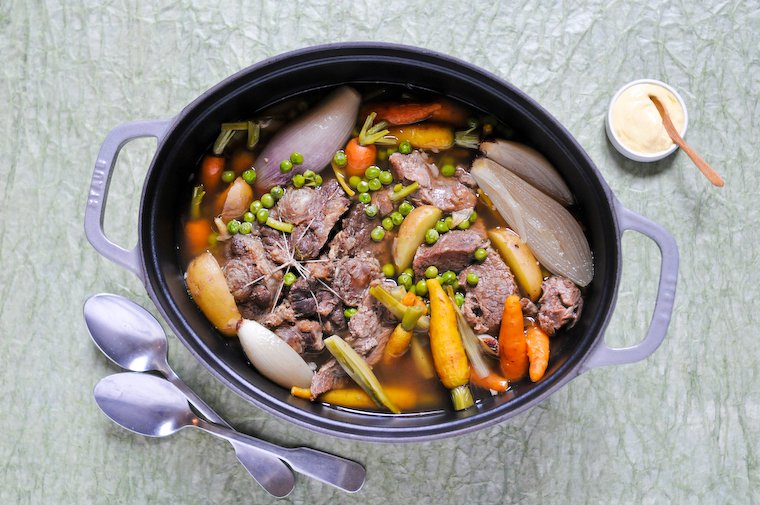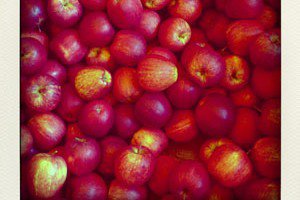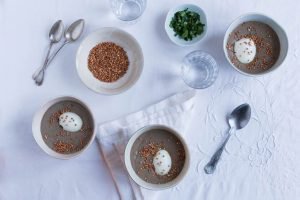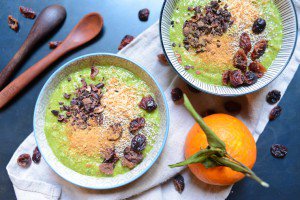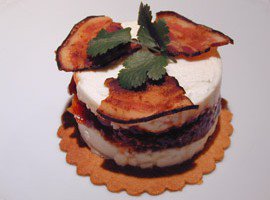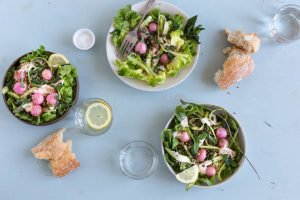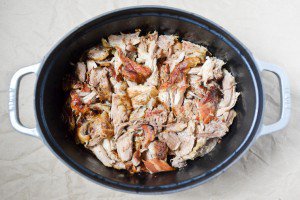Our spring has been less than exemplary, with record low temperatures and downpours. And in a country that loves (loves!) to complain about the weather, the season has turned into a total moan fest.
I usually try to steer clear of such discussions — is there anything less constructive than griping about something no one can control? — and just nod non-noncommittally whenever bad-weather comments are made. But in this instance, even I have to admit that boy, this May has felt a lot like a November.
The lovely thing about pot-au-feu is that is it meant to be served in two installments: first the broth, with fresh herbs and good crusty bread, and then the meat and vegetables, with more of the broth, strong mustard, and perky little cornichons.
And so, in order to bridge the gap between the expected season and the actual one, I decided to make a springtime pot-au-feu. It would combine the comforts of this epitomic cold-weather beef stew with the vibrancy of the first sprightly vegetables that have bravely managed to sprout and grow despite the unseemly meteorologic conditions: pencil-thin new carrots, baby fennel bulbs, green peas, and waxy little potatoes.
For a really good pot-au-feu, you need to cook the meat for a goooood loooong time — four hours is just about right — and you need to make it the day before you intend to serve it: this allows the flavors to deepen, and gives you a chance to skim some of the fat from the broth, making the whole dish lighter and more refined.
The classic wintry pot-au-feu typically includes leeks, carrots, turnips, celeriac, and potatoes, and sometimes cabbage, which are added to the meat as it cooks until they become very very tender. In my version, since the vegetables I wanted to feature were quick to cook, I first stewed the meat with the odds and ends I keep in the freezer for stock-making purposes, such as leek greens and fennel tops, to produce a flavorful broth in which to cook the star vegetables at the last minute.
The lovely, lovely thing about pot-au-feu is that is it meant to be served in two installments: first the broth, with fresh herbs and good crusty bread, and then the meat and vegetables, with more of the broth, strong mustard, and perky little cornichons*.
Pot-au-feu is ordinarily a dish that I would cook for company, but this time I decided to make it just for us, with good meat I had purchased through the Ruche qui dit oui!. We got three splendid dinners out of it during a very busy week when it was a blessing to have our evening meals ready to reheat in minutes. (I will also note, if case you have a young child at home, that my one-year-old took to the dish like a duck to water; this currently holds his record for most food-related enthusiasm.)
* You can even wedge in a third attraction by cooking marrow bones (one section per guest) in the broth for 30 minutes, and serving them with toasted bread after the broth and before the meat, sprinkled with fleur de sel and black pepper. Marrow bones may also be roasted in the oven at 200°C (400°F) for 25 to 30 minutes.

Have you tried this? Share your pics on Instagram!
Please tag your pictures with #cnzrecipes. I'll share my favorites!
Ingredients
- 1.5 kilos (3 1/3 pounds) sustainably raised beef for stewing (see note below), cut into 5-cm (2-inch) cubes
- leek greens from about 3 leeks, roughly chopped
- 1 large carrot, sliced
- 8 fennel stalks or 2 celery stalks, roughly chopped
- 2 cloves garlic, roughly crushed
- 1 medium onion, roughly chopped
- 2 cloves
- 1/4 teaspoon black peppercorns, crushed with the side of the blade
- 1 bay leaf
- 1 teaspoon herbes de Provence or similar dried herb mix (basil, rosemary, oregano, savory, thyme...)
- 1 1/2 teaspoons fine sea salt
- 450 grams (1 pound) waxy new potatoes, about 10 small ones
- 450 grams (1 pound) small new carrots, trimmed (keep a small tuft of the stem) and halved lengthwise if on the thick side
- 200 grams (7 ounces) baby fennel, trimmed and halved or quartered
- 10 shallots, peeled and halved (leave in the root end so they will keep their shape)
- 350 grams (3/4 pound, about 2 1/2 cups) shelled green peas
- chives, finely chopped
- good crusty bread
- strong mustard
- cornichons
Instructions
- In a large soup pot or Dutch oven, place the meat and cover generously with cold water. Bring to a low simmer and cook for 1 hour, skimming the foam and scum regularly as they appear. After 1 hour, add the leek greens, carrot, fennel, garlic, onion, cloves, pepper, herbs, and salt. Add water to cover generously as needed, put the lid in place, and cook at a low simmer for another 3 hours. At this point, the meat should be fall-apart tender.
- Remove the meat and vegetables from the pot separately. Set the meat aside in a sealable container that you will place in the fridge once cool. (Some people throw away the vegetables, but I prefer to eat them that night, discarding any non-edible parts and eating them as is, or puréeing them with a touch of strong mustard.) Strain the broth slowly into a large container, making sure you leave behind the sand-like, scummy bits at the bottom of the pot. Let cool on the counter then place in the fridge overnight.
- Put the potatoes in a medium pan and cover with cold water. Add salt, bring to a simmer, and cook, covered, until the potatoes are tender -- 10 to 15 minutes depending on their size. Drain and cut the potatoes in half lengthwise. Set aside.
- Remove the fat that has collected at the surface of the broth. Return to the cleaned pot, and add the new carrots, baby fennel, and shallots. Bring to a simmer and cook for 15 minutes, until very tender. Taste and adjust the seasoning.
- First, serve bowls of the broth with a sprinkle of chives and good crusty bread.
- While that's being enjoyed, add to the pot the reserved meat and potatoes, and the peas, and simmer for another 5 to 10 minutes, until the meat and potatoes are heated through and the peas are cooked.
- Serve the meat and vegetables in soup plates, ladling more broth over them, and place strong mustard and cornichons on the table.
Notes
About beef cuts: Ideally, you will ask your butcher for an assortment of cuts that includes some lean meat, some fatty meat, and some gelatinous meat. In the US, desirable cuts include short ribs, chuck, flank, brisket, rump, and round. In France, opt for macreuse, tendron, gîte, jarret, collier, plat de côte, or jumeau. I also included oxtail because I had it in the freezer.


